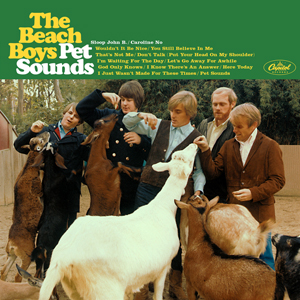Clarity of Sound and Mind
From the Tampa Bay Times, 2004

My grown daughter calls me from her car, in tears. She’s on a road trip with a friend and they’ve just listened to The Beach Boys’ Pet Sounds, an album I gave her when she was 14. “It’s so beautiful,” Sarah says. “How come people don’t make music like this anymore?”
You wonder. After defining the hedonistic early Sixties with the surf-and-turf songs of the Beach Boys, Brian Wilson quit his touring band and hunkered down in the studio to create more complex and personal music. Pet Sounds, released in 1966, was credited to the Beach Boys but was actually a Brian Wilson solo album on which the Beach Boys served as hired singers. Though a relative commercial failure, it’s regarded today as one of the greatest albums in rock’n’roll history. At turns exuberant and heart-breaking and filled with kazoos, tubas, barking dogs and fading train whistles, it was unlike anything that had gone before.
 Wilson next made his best single, “Good Vibrations,” a track driven by drums, throbbing cellos and an exotic instrument called a theremin. That record put him at the top of the pyramid, admired by the Beatles, Bob Dylan and the rest of rock’s clerisy.
Wilson next made his best single, “Good Vibrations,” a track driven by drums, throbbing cellos and an exotic instrument called a theremin. That record put him at the top of the pyramid, admired by the Beatles, Bob Dylan and the rest of rock’s clerisy.
With the whole world watching, Wilson went to work on what he called his “teen-age hymn to God,” an album to be called Smile. Leonard Bernstein featured Wilson on one of his television specials, calling the work-in-progress “an important contribution to 20th century music.” Wilson spent much of 1966 and 1967 tinkering with the album as journalists, fan and musicians awaited something akin to Holy Writ.
But what was supposed to be “the next big thing” was shelved in 1967 when the Beatles produced Sgt. Pepper’s Lonely Hearts Club Band that summer. The Beatles had surpassed Wilson, whose own band balked at singing Smile’s oblique lyrics (written by Van Dyke Parks). Over the years, snippets of Smile appeared on Beach Boys albums and box sets and obsessive fans with third-generation session tapes tried to assemble bootleg versions of what had become the most famous unreleased album in rock history.
Wilson was in no shape to finish the record. As rock’s most celebrated recluse, Wilson spent much of the next two decades in bed, getting up occasionally to take drugs. The Beach Boys continued without him, living off of his songwriting legacy, betraying Pet Sounds and Wilson’s other great songs by becoming an oldies band, one step above a lounge act. Finally shrugging off his band and his bad habits, Wilson began a fairly-active solo career at the dawn of the 1990s and hasn’t been afraid to face his past.
Four years ago, Wilson assembled a great touring band and barnstormed the country, playing Pet Sounds with symphony orchestras. Devoted fans – ever worried about Wilson’s fragile mental state (picture Bill Murray as Carl the Groundskeeper in Caddyshack) – went to shows, hoping their good will and warm, fuzzy feelings would get Wilson through the night. Turns out, he didn’t need their help. His performances were flawless.
Finishing the mostly unheard Smile, though, was another matter. Wilson was sort of like Orson Welles, who battled his legacy – a little piece of cinematic fluff called Citizen Kane that he tossed off when he was 24 – for his whole career. He never topped himself and ended his career flogging wine in television commercials.
Brian was 24 when he started on Smile. He’s 62 now and it’s finally finished.
 For those who’ve heard the fan-assembled recordings from the Beach Boys Smile sessions, the new note-perfect recording by Wilson and his superb band is startling in its precision. The tracks are nearly identical to the originals, but what’s missing is the fatigued high of the vocals on those earlier sessions. Wilson’s been clean and sober for 20 years and his voice has dropped an octave.
For those who’ve heard the fan-assembled recordings from the Beach Boys Smile sessions, the new note-perfect recording by Wilson and his superb band is startling in its precision. The tracks are nearly identical to the originals, but what’s missing is the fatigued high of the vocals on those earlier sessions. Wilson’s been clean and sober for 20 years and his voice has dropped an octave.
Yet this new recording is just as vibrant and beautiful as the unreleased tracks from 40 years ago. Wilson has arranged the music into three suites and some of the pieces truly are no more than snippets. Some of the longer pieces are familiar from earlier Beach Boys hit versions (“Heroes and Villains,” “Good Vibrations,” “Surf’s Up”) and from the occasional track the Beach Boys slipped onto their albums in the years after abandoning Smile.
But the end result of this assemblage is a seamless piece of music that celebrates childhood, history and American mythology. The music sounds at once contemporary and dated and the eccentric arrangements (lots of cellos, flutes, clarinets) recall some of the delights of Pet Sounds. Like that earlier album, Smile has what so much music today lacks: joy.
My daughter was right: People don’t make music like this anymore.
Wilson always had keen musical instincts. He was probably right to withhold Smile from release in 1967. Since the Beatles beat him to the punch with Sgt. Pepper, Smile would have been a letdown then. The album was also personal, full of celebrations of small moments and not a gigantic statement that would reveal the meaning of life to all humanity. The rock’n’roll world took itself so seriously then (see Opera, Rock) and Smile was simply comic relief.
This isn’t necessarily an album whose time has come. Likely its time will never come. This is not something that will be popular in the thudding-bass world of modern music. But it is a work of superb craftsmanship and style by one of the most gifted musicians of the rock era.

It started out as the work of a precocious musical savant heavily under the influence. It was finished by a man in his sixties, startled to still be alive, confident enough to put himself onstage with that younger self. The one thing missing is the angelic voice of Wilson’s youngest brother Carl, who sang the original “Good Vibrations.” His death from cancer in 1998 was the real end of the Beach Boys. If there is a misfire on Smile, it is the concluding track: “Good Vibrations,” with the original lyrics, sung by Brian. How could he have expected to improve on perfection?
It’s the day Smile is released, I’m driving around with my daughter – the 8-year-old this time – listening to it. After the plunking banjo verses of “Cabin Essence,” she jumps when the churning strings of the chorus come on. Soon, she’s bouncing along to the music, drumming along on the dashboard, and so I tell her the story of the man and how it took him almost 40 years to finish the album.
Savannah scowls. “What is he – lazy or something?”
“Something like that.”
(Note: When I wrote this piece about Brian Wilson’s solo version of his Smile album, there was no chance in hell that the Beach Boys would ever release their version of the most famous unreleased album in rock history. And then they did and even reunited for a wonderful, melancholy album and tour to mark the group’s fiftieth anniversary. Just when it appeared that all was right in the Beach Boys universe, the group disbanded again and pursued its favorite past-time: suing each other. )
